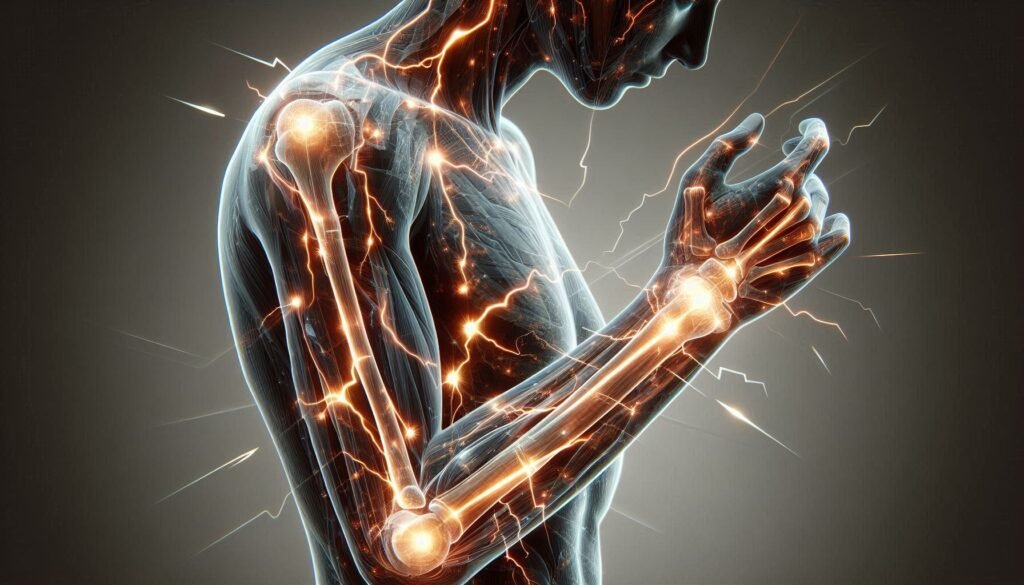Paresthesia can feel like an unwelcome guest, bringing along sensations of tingling, prickling, or numbness in various parts of the body. While often temporary and harmless, persistent paresthesia may signal underlying health issues that deserve attention. One surprising connection that many might overlook is the impact of vitamin deficiencies on nerve health.
Essential vitamins play a crucial role in maintaining optimal neurological function, and their absence can lead to alarming symptoms. This blog post dives deep into the hidden connection between vitamin deficiencies and paresthesia. We’ll explore how specific vitamins influence nerve health and highlight key deficiencies that could be at play when you experience those unsettling sensations.
Whether you’re looking for answers for yourself or someone you care about, understanding this relationship can pave the way towards better health outcomes. Let’s unravel this mystery together as we discuss how vital nutrients are essential for keeping your nerves healthy and functioning smoothly!

Paresthesia: Symptoms and Causes Overview
Paresthesia refers to abnormal sensations in the skin, often described as tingling, prickling, or numbness. It can occur anywhere in the body but is most commonly felt in the hands and feet. These sensations may be temporary or chronic and can vary in intensity depending on the underlying cause.
The causes of paresthesia are numerous. Often, it results from pressure on nerves due to prolonged positioning or injury. Conditions such as diabetes and multiple sclerosis also contribute significantly by affecting nerve function over time.
In some cases, paresthesia indicates an underlying medical issue that requires attention. Neuropathy from vitamin deficiencies is a notable example where lack of essential nutrients compromises nerve health.
Stress and anxiety can exacerbate these symptoms too. This highlights how interconnected our physical well-being is with both nutritional status and mental health factors. Understanding these aspects can lead to better management strategies for anyone experiencing paresthetic symptoms.
The Role of Vitamins in Nerve Health and Function
Vitamins play a crucial role in maintaining nerve health and function. They are essential for the proper development, maintenance, and repair of nervous tissue. Each vitamin contributes uniquely to supporting neuronal health.
Vitamin B12 is particularly important for producing myelin, the protective sheath around nerves. A deficiency can lead to impaired nerve signaling and neurological issues. Meanwhile, other B vitamins like B6 and folate aid in neurotransmitter synthesis, impacting mood and cognitive functions.
Antioxidant vitamins such as E help protect neurons from oxidative stress. This damage can disrupt communication between nerves and ultimately affect overall brain function.
Vitamin D also plays a vital role by influencing neurotrophic factors that support nerve growth and resilience against injury or degeneration. Adequate levels are necessary not just for bone health but also for optimal neural performance.
Vitamin B12 Deficiency: A Primary Cause of Paresthesia
Vitamin B12 plays a critical role in maintaining the health of your nerves. A deficiency can lead to significant neurological issues, including paresthesia. This condition manifests as tingling, numbness, or burning sensations in various body parts, particularly in the hands and feet.
The human body cannot produce vitamin B12 on its own. Instead, it relies on dietary sources like meat, dairy products, and fortified foods. Vegetarians and vegans are especially at risk for deficiency due to limited food options rich in this essential nutrient.
When levels of B12 drop too low, nerve damage may occur over time. This damage disrupts normal communication between nerves and the brain. The result is often discomforting sensations that can interfere with daily life.
Early detection of a vitamin B12 deficiency is crucial for effective treatment. Supplementation or dietary adjustments can help restore normal levels and alleviate symptoms related to paresthesia before they become severe.
Vitamin B6 (Pyridoxine): Its Impact on Peripheral Neuropathy
Vitamin B6, also known as pyridoxine, plays a crucial role in maintaining nerve health. This vitamin is essential for the synthesis of neurotransmitters, which are vital for communication between nerve cells. Without adequate levels of B6, neurological functions can become impaired.
A deficiency in Vitamin B6 may contribute to peripheral neuropathy—a condition characterized by tingling, numbness, and pain in the extremities. The lack of this important nutrient disrupts normal nerve function and can lead to inflammation and damage over time.
Symptoms often vary among individuals but can significantly impact daily life. People with low B6 levels may experience persistent sensations that make it difficult to perform routine tasks or even enjoy leisure activities.
Ensuring sufficient intake of Vitamin B6 through diet or supplements is essential for those at risk of developing peripheral neuropathy. Foods rich in pyridoxine include fish, poultry, potatoes, bananas, and fortified cereals—making it easier to incorporate into your daily nutrition plan.
Vitamin E Deficiency and Neurological Symptoms
Vitamin E is a crucial antioxidant that protects nerve cells from oxidative stress. A deficiency in this vitamin can lead to a range of neurological symptoms, including paresthesia. Individuals may experience tingling sensations, numbness, or weakness in their limbs due to impaired nerve function.
Research indicates that low levels of Vitamin E can disrupt the integrity of cell membranes within the nervous system. This disruption affects communication between nerves and muscles, leading to difficulties in coordination and movement. Symptoms may vary among individuals but often include balance issues and muscle cramps.
Furthermore, Vitamin E deficiency is also linked to more severe conditions like peripheral neuropathy. The effects may progress slowly over time; hence awareness is key for early detection and intervention.
Dietary sources rich in Vitamin E include nuts, seeds, spinach, and broccoli. For those with absorption disorders or limited diets, supplementation might be necessary to prevent potential neurological complications associated with this deficiency.
The Connection Between Vitamin D Deficiency and Paresthesia
Vitamin D plays a crucial role in maintaining proper nerve function and health. When the body lacks adequate levels of this vital vitamin, it can lead to various neurological issues, including paresthesia. This condition is characterized by abnormal sensations such as tingling or numbness, often felt in the extremities.
Research has shown that low vitamin D levels may contribute to inflammation and autoimmune responses that affect nerve tissues. These processes could potentially disrupt normal nerve signaling, resulting in those uncomfortable feelings associated with paresthesia.
Furthermore, certain populations are more susceptible to vitamin D deficiency due to limited sun exposure or dietary habits. Individuals living in northern latitudes or those who spend most of their time indoors may find themselves particularly vulnerable.
Addressing vitamin D deficiency through diet or supplementation can be beneficial not just for overall health but also for alleviating symptoms like paresthesia. Regular screenings and blood tests can help identify those at risk and ensure timely intervention.
Folate (Vitamin B9) Deficiency and Its Neurological Effects
Folate, also known as Vitamin B9, plays a crucial role in nerve health and function. It is essential for DNA synthesis and repair, making it vital for cell division. When the body lacks adequate folate, neurological symptoms can arise that may include paresthesia.
A deficiency in folate can lead to impaired myelin formation around nerves. This protective layer is necessary for efficient neural communication. Without sufficient myelin, individuals may experience tingling or numbness in their extremities.
Additionally, low levels of folate are linked to an increased risk of mood disorders like depression and anxiety. These conditions often correlate with physical symptoms such as paresthesia. The connection between mental health and nerve function highlights the importance of maintaining optimal vitamin levels.
Dietary sources rich in folate include leafy greens, legumes, nuts, and fortified grains. Ensuring a balanced diet can help prevent deficiencies that contribute to neurological issues like paresthesia.
Vitamin B1 (Thiamine) Deficiency: Beriberi and Paresthesia
Vitamin B1, also known as thiamine, plays a crucial role in maintaining nerve health. A deficiency can lead to serious neurological issues, including paresthesia—a condition characterized by tingling or numbness in the limbs. This is often due to the impairment of peripheral nerves caused by inadequate thiamine levels.
Beriberi is a disease directly linked to severe thiamine deficiency. It manifests in two primary forms: wet and dry beriberi. Wet beriberi affects the cardiovascular system, while dry beriberi primarily impacts the nervous system, leading to symptoms like muscle weakness and sensory disruptions.
As nerve function declines with low thiamine levels, individuals may experience heightened sensations or loss of feeling altogether—hallmarks of paresthesia. The connection between these symptoms highlights the importance of adequate vitamin B1 intake for overall nerve health.
Dietary sources rich in thiamine include whole grains, legumes, nuts, and fortified cereals. Ensuring a balanced diet can help prevent deficiencies that may contribute to neurological complications such as paresthesia.
Identifying and Diagnosing Vitamin-Related Paresthesia
Identifying vitamin-related paresthesia involves recognizing symptoms such as tingling, numbness, or burning sensations in the extremities. These sensations can often be subtle initially but may progress to more severe discomfort if left unaddressed. It’s essential to pay attention to other accompanying signs like weakness or muscle cramps.
Healthcare providers typically conduct a thorough medical history and physical examination. They will inquire about dietary habits, lifestyle factors, and any existing health conditions that could contribute to deficiencies. Lab tests play a crucial role in diagnosing specific vitamin deficits.
Blood tests are commonly used to measure levels of key vitamins associated with nerve health, particularly B12, B6, and folate. Imaging studies may also be warranted if there is suspicion of underlying neurological issues unrelated to nutrition.
Prompt identification is vital for effective treatment strategies. Early intervention can lead not only to symptom relief but also prevent further nerve damage caused by prolonged deficiencies.
Treatment and Prevention: Addressing Vitamin Deficiencies
Addressing vitamin deficiencies is crucial for maintaining optimal nerve health and preventing conditions like paresthesia. The first step involves identifying the specific deficiency through blood tests and medical evaluations. Once diagnosed, dietary changes can play a significant role in treatment. Incorporating foods rich in essential vitamins can help restore balance.
For example, if you’re deficient in vitamin B12, consider adding more animal products to your diet such as fish, meat, eggs, and dairy. Fortified cereals can also be beneficial for those who follow plant-based diets. Vitamin B6 sources include poultry, fish, potatoes, chickpeas, bananas, and fortified cereals.
Supplements provide another avenue for addressing deficiencies but should be taken under professional guidance to avoid excessive intake or adverse reactions. For instance, high doses of certain vitamins may lead to toxicity rather than improvement.
Regular check-ups with healthcare professionals are important not only for monitoring existing conditions but also for ensuring that recommended dietary adjustments are effective over time. With proactive measures around nutrition and supplementation combined with regular health assessments, individuals can significantly reduce their risk of experiencing the neurological symptoms associated with vitamin deficiencies and pave the way toward better overall well-being.


